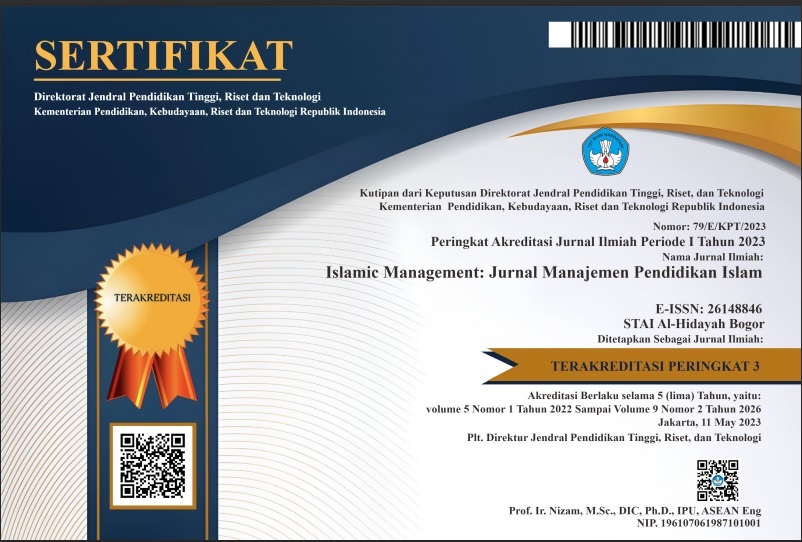THE ROLE OF DIGITAL LITERACY IN ARABIC LANGUAGE LEARNING IN THE ERA OF INDUSTRIAL REVOLUTION 4.0
DOI:
https://doi.org/10.30868/im.v8i01.8197Keywords:
Digital Literacy, Arabic Language Learning, Industrial Revolution 4.0, Educational TechnologyAbstract
The development of technology in the era of the Industrial Revolution 4.0 brings significant changes in the world of education, including in Arabic language learning. Digital literacy is an important skill that supports the teaching and learning process effectively and innovatively. This study aims to analyze the role of digital literacy in improving the quality of Arabic language learning at various levels of education. The research method used is a descriptive qualitative approach with data collection through interviews, observations, and literature studies. The results show that digital literacy facilitates access to learning resources, increases student motivation, and enables the application of technology-based learning methods such as e-learning and blended learning. In addition, the ability to integrate technology in Arabic learning helps students understand the material more interactively and contextually. This study concludes that digital literacy plays an important role in creating a more dynamic and adaptive learning experience according to the needs of the times. Therefore, it is necessary to develop digital literacy skills for educators and learners to optimize Arabic learning outcomes in the digital era.
References
Al-Harbi, S. (2020). The Impact of Digital Learning on Arabic Language Acquisition: A Case Study. International Journal of Arabic Studies.
Al-Mansour, N., & Al-Shorman, R. (2019). Effectiveness of E-Learning in Teaching Arabic as a Foreign Language. Journal of Educational Technology & Society.
Al-Tamimi, A. (2021). Digital Literacy and Arabic Language Pedagogy: Challenges and Opportunities. Arab World English Journal.
Amri, R. (2020). Pemanfaatan Teknologi Digital dalam Pembelajaran Bahasa Arab di Sekolah Menengah. Jurnal Pendidikan Bahasa Arab.
Anderson, J. (2022). The Role of Artificial Intelligence in Arabic Language Learning. International Journal of Linguistics and AI.
Badawi, A. (2018). E-Learning Strategies for Enhancing Arabic Language Skills among Non-Native Speakers. Journal of Applied Linguistics.
Bashir, M. (2021). Blended Learning in Arabic Language Education: A Systematic Review. Journal of Language Teaching Research.
Fadhil, M. (2020). Peran Media Sosial dalam Meningkatkan Kemampuan Bahasa Arab Mahasiswa. Jurnal Studi Bahasa Arab.
Hanafi, Y. (2019). Teknologi Pendidikan dalam Pembelajaran Bahasa Arab: Sebuah Kajian Literatur. Jurnal Pendidikan Islam.
Hasibuan, Z. (2021). Integrasi Teknologi Digital dalam Pembelajaran Bahasa Arab di Perguruan Tinggi. Jurnal Inovasi Pendidikan.
Hamdan, R. (2022). The Influence of Digital Games on Arabic Vocabulary Acquisition among Young Learners. Journal of Language Learning Technologies.
Kurniawan, H. (2020). Pemanfaatan Aplikasi Mobile dalam Pembelajaran Bahasa Arab di Era Digital. Jurnal Linguistik Terapan.
Nasser, H. (2019). Augmented Reality in Arabic Language Learning: A New Perspective on Teaching and Engagement. Journal of Educational Innovation.
Rahman, F. (2021). Tantangan dan Peluang dalam Menerapkan Literasi Digital dalam Pembelajaran Bahasa Arab. Jurnal Bahasa dan Sastra.
Zulkarnain, A. (2022). Efektivitas Platform E-Learning dalam Pembelajaran Bahasa Arab di Era Revolusi Industri 4.0. Jurnal Teknologi Pendidikan Islam.
Downloads
Published
How to Cite
Issue
Section
Citation Check
License
Copyright (c) 2025 Basuki Rohmat, Asep Maulana, Mokhammad Miftakhul Huda

This work is licensed under a Creative Commons Attribution-ShareAlike 4.0 International License.
Authors who publish with this journal agree to the following terms:
- Authors retain copyright and grant the journal right of first publication with the work simultaneously licensed under a Creative Commons Attribution License that allows others to share the work with an acknowledgment of the work's authorship and initial publication in this journal.
- Authors are able to enter into separate, additional contractual arrangements for the non-exclusive distribution of the journal's published version of the work (e.g., post it to an institutional repository or publish it in a book), with an acknowledgment of its initial publication in this journal.
- Authors are permitted and encouraged to post their work online (e.g., in institutional repositories or on their website) prior to and during the submission process, as it can lead to productive exchanges, as well as earlier and greater citation of published work (See The Effect of Open Access).






